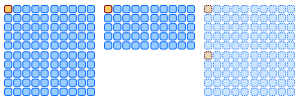Potato paradox facts for kids
The potato paradox is a fun math puzzle that gives a surprising answer. It shows how our brains can sometimes trick us when dealing with percentages and weights. Even though it's called the potato paradox, it's really about how percentages work when one part of something changes.
Understanding the Potato Problem
Imagine a farmer named Fred who brings home a big batch of potatoes. Let's say he has 100 kilograms (kg) of these potatoes. These potatoes are very watery! They are made up of 99% water. This means only 1% of their weight is actual potato "stuff" (the dry part).
Fred leaves the potatoes outside overnight. During the night, some of the water evaporates, meaning it turns into vapor and goes into the air. The next morning, the potatoes are now 98% water.
The big question is: What is the new weight of the potatoes?
The Surprising Answer
Most people might guess the new weight is close to 99 kg or 98 kg, since only a small percentage of water evaporated. However, the surprising answer is 50 kg! The potatoes lose half their weight, even though the water percentage only dropped from 99% to 98%.
How the Paradox Works
To understand this, let's think about the parts of the potato:
- Water: This is the part that can evaporate.
- Dry Matter: This is the solid part of the potato that does not change weight.
When Fred first brought home 100 kg of potatoes that were 99% water, here's the breakdown:
- 99% of 100 kg is 99 kg of water.
- 1% of 100 kg is 1 kg of dry matter.
So, we have 1 kg of dry potato matter. This 1 kg of dry matter will stay the same, no matter how much water evaporates.

Now, after the water evaporates, the potatoes are 98% water. This means the dry matter must now make up 2% of the total weight. Remember, the amount of dry matter is still 1 kg.
So, if 1 kg of dry matter is 2% of the new total weight, we can figure out the new total weight.
- If 2% of the total weight is 1 kg, then 1% of the total weight would be 0.5 kg (half of 1 kg).
- To find 100% of the total weight, we multiply 0.5 kg by 100.
- 0.5 kg * 100 = 50 kg.
This means the total weight of the potatoes is now 50 kg. The 1 kg of dry matter now makes up 2% of the 50 kg total (1/50 = 0.02 = 2%). The remaining 49 kg is water (98% of 50 kg).
The key is that the dry matter's percentage of the total weight doubled (from 1% to 2%). Since the actual amount of dry matter (1 kg) didn't change, the total weight of the potatoes had to be cut in half to make that percentage work out.
See also
 In Spanish: Paradoja de las patatas para niños
In Spanish: Paradoja de las patatas para niños
 | Delilah Pierce |
 | Gordon Parks |
 | Augusta Savage |
 | Charles Ethan Porter |

